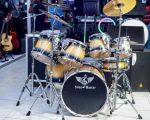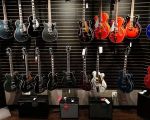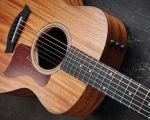Top Keyboard Brands for Music Production: Best Choices for Producers
1. My Journey to Finding the Best Keyboard for Music Production
When I first started producing music, I had no idea how much the quality of my keyboard could impact my workflow and sound. I quickly learned that the right keyboard is an essential tool for producing music. I spent countless hours researching, testing, and experimenting with different keyboards until I found the ones that truly elevated my music production experience. In this article, I’ll walk you through some of the best keyboard brands that are perfect for music production, sharing my personal experiences along the way.
2. Why the Right Keyboard Matters in Music Production
A good keyboard is more than just a tool to input notes—it’s the heart of your setup, affecting how you interact with your DAW (digital audio workstation) and how you create your sound. For me, finding the right keyboard meant finding something that offered great tactile feedback, responsive keys, and seamless integration with my software. It wasn’t just about playing music; it was about creating music with ease, comfort, and precision.
What’s more, many keyboards come with additional features like MIDI compatibility, touch-sensitive keys, and customizable controls, making them indispensable for modern music production. Choosing the right keyboard also influences the sound design process, helping you feel more connected to the music you’re creating. In my case, finding a keyboard that suited my production style helped me unlock my creativity and improve the quality of my tracks.
3. Top Keyboard Brands for Music Production
After spending a lot of time using various keyboards for music production, I’ve narrowed down the top brands that consistently offer high-quality, reliable, and feature-packed products. Below are my top recommendations for music producers:
3.1. Roland: Legendary for MIDI Keyboards
Roland has long been a favorite among music producers, and for good reason. Their MIDI keyboards, like the Roland A-88MKII, are renowned for their precision, durability, and responsiveness. I’ve used Roland keyboards for years, and they consistently impress me with their solid construction and performance. The A-88MKII, for example, features 88 weighted keys that provide an authentic piano feel, making it ideal for those who want to play with expression and detail.
Additionally, Roland keyboards are known for their seamless integration with various DAWs and their versatility in studio and live environments. Whether you're producing electronic music or working with live instruments, Roland’s keyboards offer incredible flexibility and sound quality.
3.2. Akai Professional: A Producer’s Favorite
Akai Professional is another brand that has become synonymous with quality in the music production world. I’ve personally used several Akai keyboards, including the Akai MPK249, and they never disappoint. Akai’s MIDI controllers are particularly known for their responsive pads, which are perfect for triggering sounds and samples.
One feature that stands out about Akai keyboards is their ease of use. The integration with popular DAWs like Ableton Live and Logic Pro is seamless, and their pads are highly customizable, making it a favorite for both novice and professional producers. The MPK249, with its 49 keys, is perfect for producers who need a compact but feature-rich keyboard.
3.3. Native Instruments: The Ultimate Control
Native Instruments is a brand that truly understands the needs of music producers, offering a range of keyboards that offer high functionality and great sound. The Komplete Kontrol S88 is one of my go-to keyboards. Its 88-key weighted keybed offers an incredible playing experience, and the integration with Native Instruments’ Komplete software suite makes it an incredibly powerful tool.
What I love most about Native Instruments is how their keyboards are designed to streamline your workflow. The intuitive light guide system on the Komplete Kontrol S88 provides visual feedback, which helps me when I'm working with different sounds and plugins. It’s an indispensable tool for creating complex compositions with ease, especially if you’re using Native Instruments’ vast library of virtual instruments and effects.
3.4. M-Audio: Affordable and Reliable
If you're just starting out in music production and want a reliable yet affordable keyboard, M-Audio is an excellent brand to consider. I’ve had the pleasure of working with their Keystation series, particularly the Keystation 61 MK3. For its price, this keyboard offers great quality, and it’s perfect for producers who need a straightforward, no-frills MIDI controller.
M-Audio keyboards offer solid performance with responsive keys and MIDI functionality, all while being easy to set up. It’s a great option for producers who want a budget-friendly keyboard without sacrificing too much in terms of quality or features.
3.5. Arturia: Combining Vintage and Modern
Arturia is a brand that I’ve found to be a great blend of both vintage and modern elements in their keyboards. The Arturia KeyLab 88, for instance, combines the feel of a traditional piano with modern MIDI capabilities. The weighted keys provide an authentic piano feel, while the customizable knobs and faders give you the ability to tweak your sound to perfection.
Arturia’s keyboards are designed with an eye for detail, and their integration with software like Analog Lab makes it easy to create a wide range of sounds. If you're into sound design and want a keyboard that lets you experiment with different styles, Arturia is definitely a brand you should check out.
4. Key Features to Look for in a Keyboard for Music Production
When shopping for a keyboard for music production, there are several key features to keep in mind. Based on my experience, here are a few things that should be on your radar when choosing a keyboard:
4.1. Keybed Type
The type of keybed is one of the most important factors. Some keyboards have weighted keys, which feel more like a traditional piano, while others offer semi-weighted or unweighted keys. If you're a pianist, you may want a keyboard with weighted keys, as it provides a more natural feel. I personally prefer weighted keys because it gives me more expression when playing.
4.2. MIDI Integration
MIDI compatibility is another critical feature. Look for a keyboard that integrates well with your DAW, whether it's Ableton Live, Logic Pro, or FL Studio. MIDI controllers allow you to control virtual instruments, effects, and other software functions directly from your keyboard. This makes your workflow much faster and more intuitive. Most of the brands I mentioned above offer excellent MIDI integration.
4.3. Pad Controls and Customization
If you’re into beat-making or sampling, keyboard pads are essential. Brands like Akai and M-Audio offer highly responsive pads that are perfect for triggering sounds and creating beats. Additionally, customizable controls (knobs, faders) allow you to adjust your sound in real-time, which is particularly useful when performing live or during production.
5. Conclusion: Finding the Right Keyboard for Your Production
After years of experimenting with different keyboards, I can confidently say that choosing the right one truly comes down to personal preference and your production needs. Whether you're looking for something simple and budget-friendly like the M-Audio Keystation or a more professional setup like the Native Instruments Komplete Kontrol S88, there’s a keyboard out there that will suit your style.
If you're looking for more information on the best keyboards for music production or need recommendations tailored to your needs, be sure to check out Beat Trigger, where you’ll find expert guidance on choosing the perfect gear.








